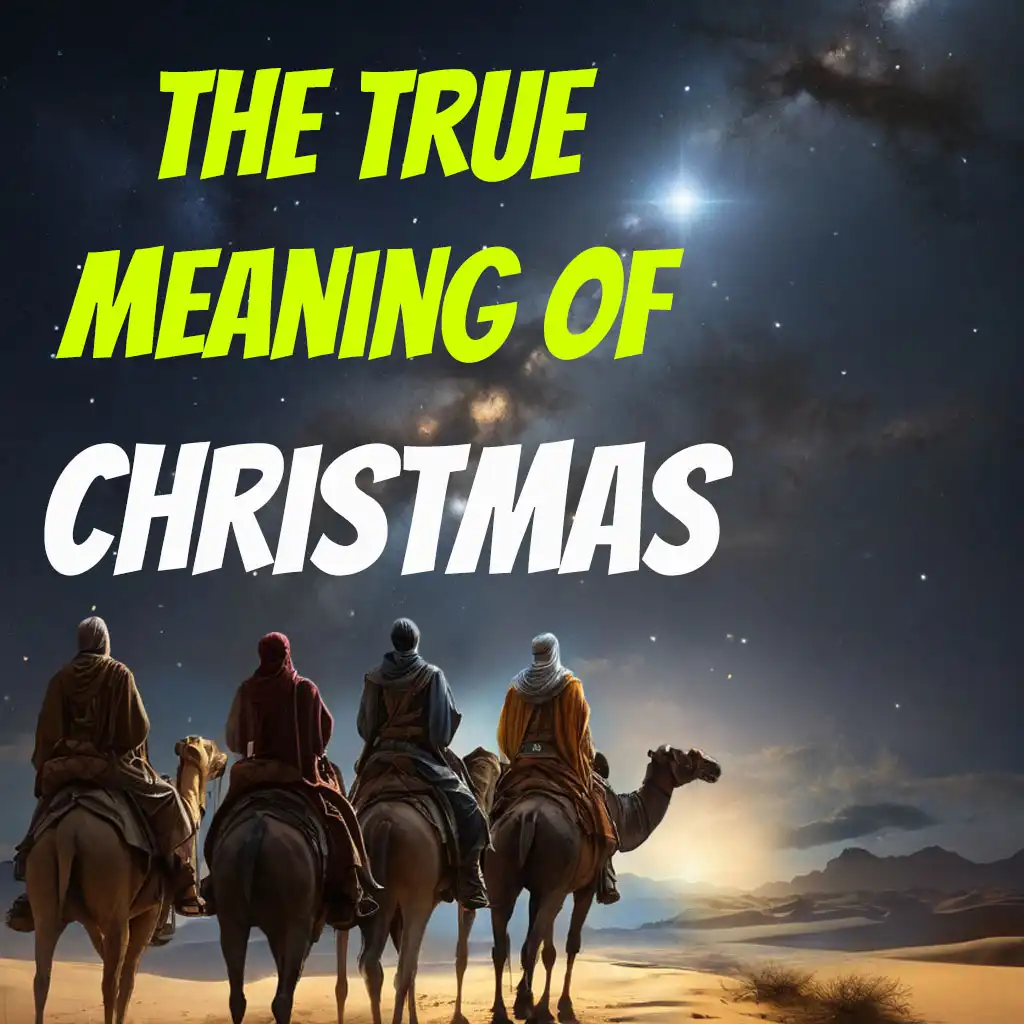Is Christmas a pagan holiday?
Yes and No.
But first, some background to Christmas.
What is Christmas? Why is it a holiday?
Origin of Christmas
Christmas is a time when Christians celebrate the birth of Jesus Christ. It is a time of peace and joy. Why?
Because God sent down His son to be an atonement and save us from our sin forever, to make us right with God for all times.
Why is this important?
Ever since the first sin by Adam and Eve, we have always been under God's wrath. Nothing we do can please God. However, God, being our Father, gave us rules and guidelines through the Old Testament for the chosen people of Israel to follow. But did we follow his laws?
Unfortunately, we blew it. We are sinful to the core.
"for all have sinned and fall short of the glory of God, and all are justified freely by his grace through the redemption that came by Christ Jesus."
Romans 3:23-24
How can sinful humans be made right with God?
God had a plan. The only way to bridge man to God is through His Son, Jesus Christ. We will discuss this in detail in another post.
How did the word Christmas come about?
The word Christmas comes from the old English word "Cristes Maesse", coined by the Catholic Church in AD 1038, which means "Mass of Christ," which would give you "Chirst" and "mass" - Christmas. In ancient times, Christmas was a Catholic service to commemorate the birth of Jesus Christ, with the eating of bread and the drinking of wine.
Does the Bible instruct Christians to celebrate Jesus' birthday?
Nope. There was no evidence or indication anywhere in the Bible that encourages Christians to celebrate Christmas. Even the early fathers did not list Christmas as one of the feasts to be celebrated.
So why do Christians still celebrate the birthday of Christ today?
We humans are social creatures. It is in our nature of love to celebrate events of happiness, like birthdays, for friends, family, and loved ones. So why not celebrate the birthday of our Lord Jesus?
But since it is unbiblical, then
Is it a sin to celebrate Christmas?
Well, it depends on how you view Christmas. Read what Paul said..
"I have the right to do anything," you say-but not everything is beneficial. "I have the right to do anything"-but not everything is constructive."
1 Corinthians 10:23 (NIV)
Celebrating Christmas is not inherently wrong as long as you keep true to the message of Christ being born on earth to die for our sins and make us right with God. Christians celebrate Christmas because of the love they have for their Lord Jesus Christ, nothing else.
How then do you make Christmas celebration beneficial and constructive?
You should
- make Christmas a time of spreading the good news to your non-believer friends
- give gifts only to the needy who cannot pay you back
- repent, self-reflect and grow towards God through reading His Word
However, if celebrating Christmas becomes a stumbling block for you, then please DO NOT celebrate Christmas and DO NOT practice any of the traditions!
Was Jesus born on December 25?
No. We do not know the exact date of Jesus' birth.
However, there are three possible arguments for the origin of December 25 as Christmas.
#1 Emperor Constantine and Council of Nicaea
The most popular notion of how 25 December came to be was that the Roman emperor Constantine decided it during the first council of Nicaea in AD 325. However, there was no evidence that this decision was made during that meeting with the religious leaders.
One of the agenda items for the meeting was to discuss the nature of Christ so as to quell the spread of different beliefs in various churches at that time.
There was no evidence that the First Council of Nicaea decided the date of Christmas to be December 25.
#2 Pagan Holiday and Winter Festivals
In ancient times, people celebrated many festivals attributing to nature, like the Germanic festivals, The Wheel of the Year, starting with the Winter Solstice, Yule.
The winter solstice is celebrated on the shortest day of the year, about December 21st. There was more darkness than light during the month. Many pagans believe that Yule is an important part of the life cycle of the 'Child of Promise'.
The child was conceived and born in the winter solstice as the 'Sun Child', who will defeat the powers of darkness in the coming spring, ushering in nature's triumphant return.
Do you see the similarities?
Missionaries and the church hoped to convert pagans to Christianity by embracing their traditions and celebrations. The church even instructed their missionaries to convert their temples into churches.
Some skeptics so eagerly believed that it was Constantine who decreed the date of celebration of Christmas (after the edit of Milan in AD 313). He believed that Jesus was the sun god and hoped to coincide the date with the celebration of his pagan Sol Invictus.
Unfortunately, there was no sufficient evidence to support this notion because Constantine continued venerating the sun god in his later years. The edit of Milan was not only for the Christians to worship Jesus as God but also for anyone to worship whomever they desire. In other words, Constantine allowed religious freedom in all of Rome in AD 313
Constantine said he converted to Christianity. But he was baptised only just before his death in AD 337. So his so-called conversion was likely a political and financial move to garner support because the Christians, at that time, were spreading like wildfire.
We will talk about the spread of Christianity in another post.
Saturnalia was also another Roman celebration, but for their god Saturn during the winter. It was celebrated on December 17 and lasted for about seven days. The celebration included merry-making and banquets to honour the god of agriculture. This is not December 25.
This practice continued until about the 4th century, when Rome adopted Christianity as the main religion. However, some of these pagan practices survived and had somewhat influenced how Christmas is presently celebrated today.
It was the Roman Emperor Aurelian who started the feast of the birth of Sol Invictus on December 25 in AD 274 (before Constantine). The Sun-God, or "unconquered sun," was Rome's main religion at that time. However, some scholars have debated that it was Aurelian who followed the December 25 date of Christ's birth instead.
How come?
Because of the two Christians, Sextus Julius Africanus (AD 160-240) and Hippolytus (AD 170-235).
Let's find out more.
#3 Calculation Hypothesis and Jewish Beliefs
So was there any evidence that Christmas was dated December 25, before AD 275?
(A) Sextus Julius Africanus (AD 160-240)
Julius Africanus was the first Christian historian who worked on calculating the chronological dates of events that occurred in the Bible. Most of his works were lost except fragments. Scholars have studied these fragments and concluded that his calculation of Christ's death was on March 25.
The ancient Jewish people believed that extraordinary people lived and died on the same day, or what some termed the "integral age". They believed that since Christ died on March 25, he must have also been conceived on March 25.
With this notion in mind, nine months after conception, Jesus Christ would have been born on December 25.
In the same vein, Christians in the East (Coptic Churches) believed that Christ died on April 6 and was born on January 6, exactly 9 months later. Again, these are ancient religious beliefs held during that time.
(B) Hippolytus of Rome (AD170-235)
Hippolytus was a Christian theologian who also made efforts to calculate the date of Jesus birth. I believe Julius Africanus had some influence on how Hippolytus calculated and viewed Jesus' date of birth.
Because, in agreement, Hippolytus also claimed that Christ resurrected on March 25, which is also the date when Jesus was conceived. Nine months later, Jesus was born on December 25.
As you can see, the early Christians had already decided on Christ's birth on December 25, latest by AD 240, even though this date may not be accurate.
And this was done way before, about 30 years before the Roman emperor Aurelian established the worship of the sun god Sol Invictus in AD 274.
In conclusion, Hippolytus and Sextus Julian Africanus had, by AD 240, determined the date of December 25 as the birth date of Christ.
It was not, as skeptics believe, a copy of other pagan festivals, such as Saturnina (wrong celebration date) or the festival of Sol Invictus (which was established later in AD 274).
However, the actual date of Christ's birth is still unknown.
But Christians worldwide had accepted December 25 as the birth date of Jesus Christ, hence the date of Christmas.
We can investigate and discuss the year of Christ's birth further in another post.

How about the origins of Christmas celebration practices? Are they of pagan origins?
Largely yes! Most of the Christmas practices that you see today were derived from pagan practices and traditions. Most of them were adopted mainly to allow non-believers to embrace and spread Christianity.
Let's briefly discuss three common Christmas traditions.
#1 Christmas Tree, Wreaths, Holly and Mistletoes
Tree worship and sacrifice was an ancient pagan druidic practice that began in Germany. Some of their early traditions continued with the German Lutherans when they brought in evergreen yule trees into their homes, as they symbolized everlasting life and fertility.
Pagans also believed that decorating the house with these trees, wreaths, holly, mistletoes, and lights could help ward off evil. German Christians continued with these traditions into the 16th century.
It was not until 1848, when Queen Victoria's German husband, Prince Albert, introduced his old German tradition of decorating their Christmas tree at home, that the Christmas tree became popular!
The image of the royal family and children decorating a Christmas tree caught the attention of the American public, and they loved it.

Everyone jumped in on the Christmas tree tradition. And so the Christmas celebration began!
But isn't setting up the Christmas tree a pagan practice and ungodly?
Unlike pagans, who bring in the trees and worship them in their homes, Christians set up Christmas trees as a tradition to show peace and joy. Christians do not worship or idolize the tree or the decorations on the tree.
However, if the Christmas trees and wreaths cause you to stumble, then please don't do it! Go to God in prayer.
#2 Giving Christmas Gifts and Merry Making
Giving presents has always been part of the winter festival tradition. There were gifts and feasts during the Saturnian celebrations. Apart from this pagan influence, early Christians also practiced gifting, as it was similar to the Magi giving gifts to the child Jesus.
If, for any reason, you stumble on the giving of gifts, remember Paul's' words..
"I have shewed you all things, how that so labouring ye ought to support the weak, and to remember the words of the Lord Jesus, how he said, It is more blessed to give than to receive."
Acts 20:35 KJV
#3 Santa Claus and traditions
Almost everyone knows the origin of Santa Claus. St Nicholas was a bishop of Myra, Turkey (AD270-343) who was famous for his kindness and generosity by helping the poor with the distribution of his wealth.
St. Nicholas Day is still celebrated on the day of his death on December 6, AD 343.
The rest of the other Santa Claus traditions and stories slowly evolved over the years as children's stories for commercial gain.
Conclusion
So, is Christmas a pagan holiday?
YES. The traditions of Christmas originated from pagan sources in the past. We need to be aware of these traditions, as they are not biblical. However, as long as these are NOT idolatrous, then these are just simple traditions that all of us can enjoy and celebrate.
However, if any of these cause you to stumble, then do not celebrate Christmas in that way.
NO. The intent of Christmas was to commemorate and honour the birth of Jesus Christ, our saviour. The actual date of Christ's birth still remains unknown to this day.
Following the evidence above, we know that December 25, as Christ's birth date, was already determined even before AD240. Many of the early Christians had widely accepted the date long before the influence of any pagan worship at that time.
Embrace this mindset.
It is okay to celebrate Christmas as Jesus' birthday as it is the day of the good news and our salvation!
Listen to what the angels proclaim to the shepherds.
"Do not be afraid. I bring you good news that will cause great joy for all the people. Today in the town of David a Savior has been born to you; he is the Messiah, the Lord."
Luke 2:10-11
The Christmas traditions themselves are not evil. It is what comes out of a man that is evil.
"What comes out of a person is what defiles them. For it is from within, out of a person's heart, that evil thoughts come-sexual immorality, theft, murder, adultery, greed, malice, deceit, lewdness, envy, slander, arrogance and folly. All these evils come from inside and defile a person."
Luke 7:20-23
If your thoughts are ungodly, then it harbours evil intent.
So if you use these traditions to point to God, then you are alright. You are not worshipping any other gods but giving glory to Jesus Christ.
Remember, in all things you do, always give glory to God. That has always been our mission on Earth.
How then could we celebrate Christmas in truth?
Do the following:
- Ensure that the central message of Christmas is preserved. We celebrate Christ's birth, who is God and born as a man to take away the sins of the world
- Focus your Christmas celebrations on God by reading the bible during the festivities
- Use Christmas as a good opportunity to talk to others about Christ and the Good News.
- Invite unbelievers and celebrate Christmas with Christ as the central theme. Remember Jesus' words:
"All authority in heaven and on earth has been given to me. Go therefore and make disciples of all nations, baptizing them in the name of the Father and of the Son and of the Holy Spirit, and teaching them to obey everything that I have commanded you."
Matthew 28:18-20
Give glory to God! Have a great Christmas and a Happy New Year!
Reference
https://en.wikipedia.org/wiki/Christmas
https://www.history.com/news/christmas-traditions-history
https://en.wikipedia.org/wiki/Saint_Nicholas
https://www.thenewdaily.com.au/religion/2017/12/20/12-days-of-christmas-day-nine
https://www.britannica.com/video/202377/Christmas-December-25
https://georgesjournal.net/2019/12/24/3-explanations-of-the-origin-of-the-date-of-christmas/
https://academic.oup.com/book/25620/chapter-abstract/193011849
https://en.wikipedia.org/wiki/Sol_Invictus
https://www.vanderbilt.edu/AnS/physics/astrocourses/ast203/beginnings_christianity.html
https://en.wikipedia.org/wiki/Sextus_Julius_Africanus
https://www.newadvent.org/cathen/03724b.htm
https://en.wikipedia.org/wiki/Basilides
https://www.britannica.com/biography/Basilides
https://en.wikipedia.org/wiki/Sol_(Roman_mythology)
https://www.biblicalarchaeology.org/daily/biblical-topics/new-testament/december-25th-and-christmas/



